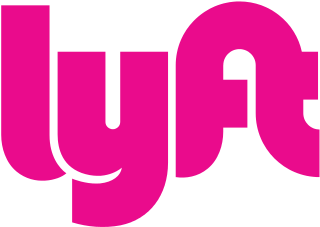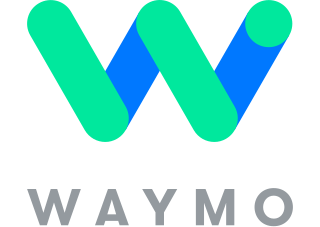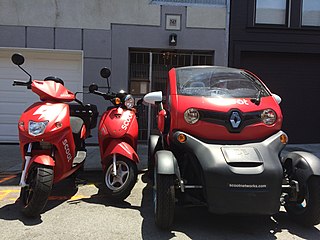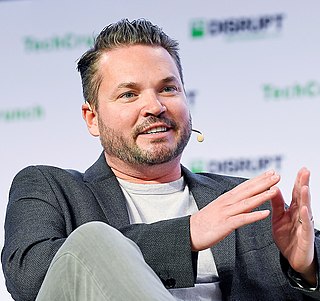
A self-driving car, also known as an autonomous car, driverless car, or robotic car (robo-car), is a car that is capable of traveling without human input. Self-driving cars use sensors to perceive their surroundings, such as optical and thermographic cameras, radar, lidar, ultrasound/sonar, GPS, odometry and inertial measurement units. Control systems interpret sensory information to create a three-dimensional model of the vehicle's surroundings. Based on the model, the car then identifies an appropriate navigation path and strategies for managing traffic controls and obstacles.

Uber Technologies, Inc. is an American transportation conglomerate that mainly provides taxi services where individuals can hail a taxi (Uber) in an app on their phone. The company, based in San Francisco, provides additional services of ride-hailing, food delivery, package delivery and freight transport in the United States and around the world.

Lyft, Inc. is an American company offering mobility as a service, ride-hailing, vehicles for hire, motorized scooters, a bicycle-sharing system, rental cars, and food delivery in the United States and select cities in Canada. Lyft sets fares, which vary using a dynamic pricing model based on local supply and demand at the time of the booking and are quoted to the customer in advance, and receives a commission from each booking. Lyft is the second-largest ridesharing company in the United States after Uber.

Waymo LLC, formerly known as the Google Self-Driving Car Project, is an American autonomous driving technology company headquartered in Mountain View, California. It is a subsidiary of Alphabet Inc., the parent company of Google.
A robotaxi, also known as robo-taxi, self-driving taxi or driverless taxi, is an autonomous car operated for a ridesharing company.

NuTonomy was an MIT spin-off technology startup company that made software to build self-driving cars and autonomous mobile robots. The company was founded in 2013. In August 2016, it launched its robo-taxi service in Singapore. In October 2017, Delphi Automotive purchased the company, which then became part of the Motional autonomous driving joint venture between Aptiv and Hyundai Motor Group.

Anthony Levandowski is a French-American self-driving car engineer. In 2009, Levandowski co-founded Google's self-driving car program, now known as Waymo, and was a technical lead until 2016. In 2016, he co-founded and sold Otto, an autonomous trucking company, to Uber Technologies. In 2018, he co-founded the autonomous trucking company Pronto; the first self-driving technology company to complete a cross-country drive in an autonomous vehicle in October 2018. At the 2019 AV Summit hosted by The Information, Levandowski remarked that a fundamental breakthrough in artificial intelligence is needed to move autonomous vehicle technology forward.

Argo AI was an autonomous driving technology company headquartered in Pittsburgh, Pennsylvania. The company was co-founded in 2016 by Bryan Salesky and Peter Rander, veterans of the Google and Uber automated driving programs. Argo AI was an independent company that built software, hardware, maps, and cloud-support infrastructure to power self-driving vehicles. Argo was mostly backed by Ford Motor Co. (2017) and the Volkswagen Group (2020).
Kitty Hawk Corporation was an American aircraft manufacturer producing electric ultralight aircraft.

Scoot Networks, also known as just Scoot or Scoot Rides, is an American company which provides public electric scooter and electric bicycle sharing systems. The company is based in San Francisco, California.

Bird Global, Inc. is a micromobility company based in Miami, Florida. Founded in September 2017, Bird has distributed electric scooters designed for short-term rental to over 400 cities.

Travis VanderZanden is an American businessman and the founder and current CEO of Bird, a scooter sharing service. Before founding Bird, VanderZanden was Chief Operating Officer at Lyft, then VP of International Growth at Uber.
Nuro, Inc. is an American robotics company based in Mountain View, California. Founded by Jiajun Zhu and Dave Ferguson, Nuro develops autonomous delivery vehicles and is the first company to receive an autonomous exemption from the National Highway Traffic Safety Administration.
Drive.ai, a subsidiary of Apple Inc., is an American technology company headquartered in Mountain View, California that uses artificial intelligence to make self-driving systems for cars. It has demonstrated a vehicle driving autonomously with a safety driver only in the passenger seat. To date, the company has raised approximately $77 million in funding. Drive.ai's technology can be modified to turn a vehicle autonomous.
Boeing NeXt was a division of aerospace manufacturer Boeing, exploring urban air mobility. Its portfolio includes a passenger air vehicle (PAV), a cargo air vehicle (CAV) and other urban, regional and global mobility platforms.

Zoox, Inc. is a subsidiary of Amazon developing autonomous vehicles that provide mobility as a service. It is headquartered in Foster City, California and has offices of operations in the San Francisco Bay Area and Seattle, Washington. Zoox sits in the Amazon Devices & Services organization alongside other Amazon units like Amazon Lab126, Amazon Alexa, and Kuiper Systems.
An electric vertical take-off and landing (eVTOL) aircraft is a variety of VTOL aircraft that uses electric power to hover, take off, and land vertically. This technology came about thanks to major advances in electric propulsion and the emerging need for new aerial vehicles for urban air mobility that can enable greener and quieter flights. Electric and hybrid propulsion systems (EHPS) have also the potential of lowering the operating costs of aircraft.

The Wisk Cora is an American autonomous personal air vehicle prototype previously developed by the Kitty Hawk Corporation, and subsequently by Wisk Aero.

The Chamber of Progress is an American trade group that represents technology companies. The organization works on issues such as antitrust law, content moderation, and self-driving cars, and describes itself as a progressive advocacy organization, while some have characterized it as a corporate front group opposing government regulation of, and unionizing among, its members. It was established in 2020 by Adam Kovacevich and is funded by Amazon, Uber, Meta, Google, Apple, Twitter, and other technology companies.
Wisk Aero is an aerospace manufacturer based in Mountain View, California, United States. The company develops self-flying electric vertical take off and landing (eVTOL) aircraft designed to be operated as air taxis. The company was formed in 2019 as a partnership between Boeing and Google co-founder Larry Page's Kitty Hawk aircraft company.













